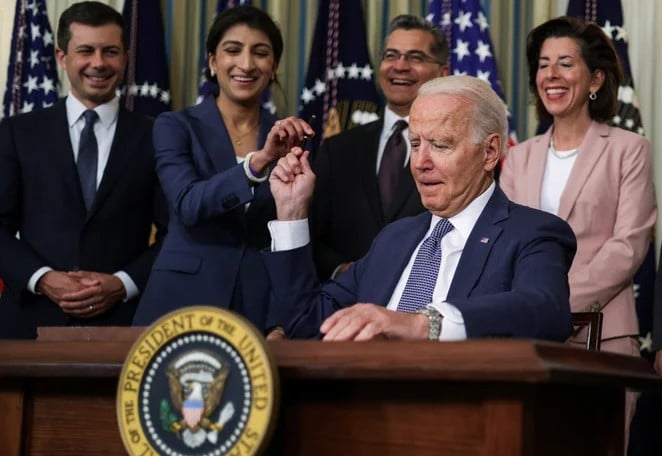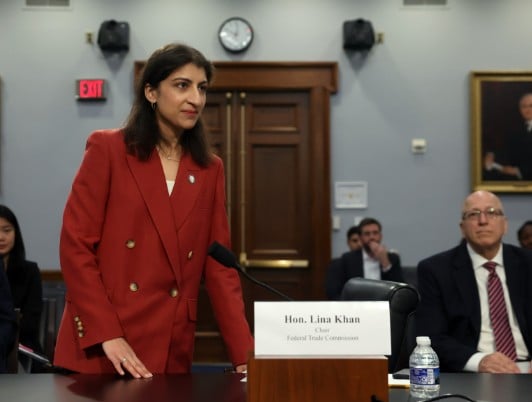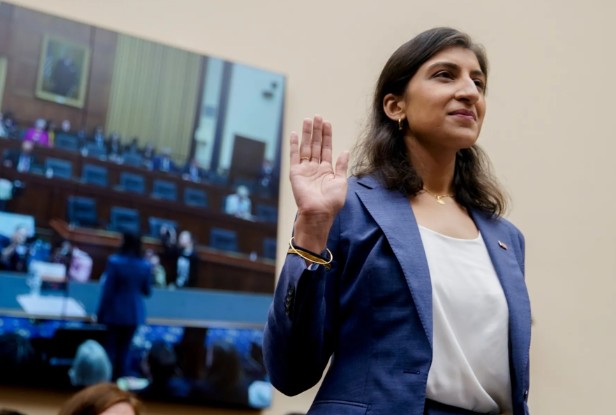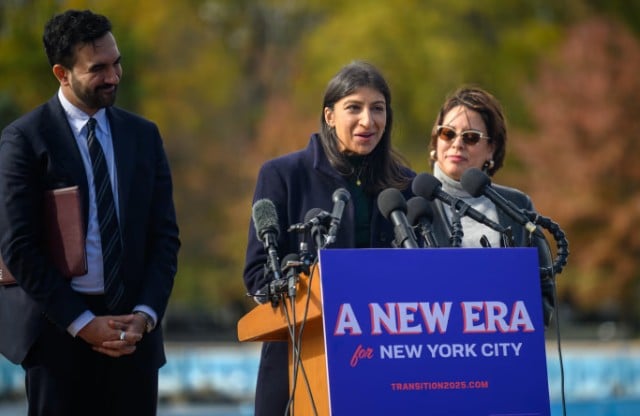Lina Khan Height, Age, Husband, Children, Family, Biography
Quick Info→
Hometown: London Borough Of Barnet, England
Husband: Shah Rukh Ali
Age: 36 Years


Some Lesser Known Facts About Lina Khan
- Lina Khan grew up in Golders Green in the London Borough of Barnet.
- One of her parents worked in management consulting, and another at Thomson Reuters.
- When she was eleven years old, her family moved to the United States in 2000. They settled in Mamaroneck, New York, where she, along with her two siblings, completed their schooling.
- At Williams College, Lina Khan served as the editor of a student newspaper. During this period, she wrote her senior thesis on Hannah Arendt.
- In 2014, she co-authored a book titled Market Structure and Political Law: A Taxonomy of Power. She then went on to publish various books, such as Arbitration as Wealth Transfer (2017), A Skeptical View of Information Fiduciaries (2019), and The Case for ‘Unfair Methods of Competition’ Rulemaking (2020).
- During her final year at Yale Law School, the Yale Law Journal published her student article, ‘Amazon’s Antitrust Paradox,’ which made a significant impact on the law and business areas in America.
- The New York Times called the article “reframing decades of monopoly law.”
-
In 2018, she worked as a legal fellow at the Federal Trade Commission (FTC) in Commissioner Rohit Chopra’s office.
-
In 2019, she started working as counsel for the House Judiciary Committee’s Subcommittee on Antitrust, Commercial, and Administrative Law.
-
After completing her law studies, Lina Khan started working as a legal director at the Open Markets Institute (OMI).
-
She then planned to work as a clerk for Judge Stephen Reinhardt at the US Court of Appeals for the Ninth Circuit. However, she joined Columbia Law School as an academic fellow to study and teach antitrust law and competition policy, with a focus on digital platforms.
-
In July 2020, Lina Khan started working as an associate professor of law at Columbia Law School.
-
On 22 March 2021, American President Joe Biden announced that he would nominate Khan to be a commissioner of the Federal Trade Commission (FTC). It was stated that the term would end on 26 September 2024.

Lina Khan while giving a pen to Joe Biden
-
When she took office, Lina Khan became the third Asian American to serve on the FTC after Dennis Yao, who served from 1991 to 1994, and Rohit Chopra, who served from 2018 to 2021.

Lina Khan during her tenure as the chairman of Federal Trade Commission (FTC)
-
Leaked documents revealed that the FTC’s ethics officer, Lorielle Pankey, found no evidence that Khan broke any ethics rules. However, Pankey suggested that Khan should step away from the Meta case to avoid the appearance of bias.
-
In the first two years of Lina Khan’s tenure as FTC chairman, according to employee surveys, staff satisfaction and trust in agency leaders had declined.
-
After she entered the agency, the FTC, which earned the most positive views in senior leadership, started receiving the most negative views among federal agencies.
-
Lina Khan took an early decision to ban public speaking for FTC staff, which most employees disliked; however, the rule was cancelled in 2022, and Khan apologised.
- In February 2023, Republican FTC Commissioner Christine Wilson announced her intention to resign. She criticised Khan’s leadership and her decision not to recuse herself from the Meta lawsuit.
-
Lina Khan then became known for her strong and bold style as FTC chairperson. She used new ideas and unusual cases for regulation, even though this sometimes led to more court losses.
- In 2024, under Lina Khan’s leadership, the FTC introduced the ‘click to cancel’ rule, making it easier for people to cancel subscription services.
- She received bipartisan support, including praise from Republican J. D. Vance and former Trump advisor Steve Bannon in 2024.
-
In 2025, Lina Khan was replaced by Andrew N. Ferguson as FTC chairman.
-
However, members from both parties, including J. D. Vance and David Cicilline, praised her efforts and believed in her ultimate success.
- She likes travelling to distant places and photography in her free time.
 Erika Kirk Height, Age, Boyfriend, Husband, Children, Family, Biography
Erika Kirk Height, Age, Boyfriend, Husband, Children, Family, Biography Joe Gebbia Height, Age, Wife, Children, Family, Biography
Joe Gebbia Height, Age, Wife, Children, Family, Biography Arvinder Singh Bahal Age, Family, Biography
Arvinder Singh Bahal Age, Family, Biography Jony Ive Height, Age, Wife, Children, Family, Biography
Jony Ive Height, Age, Wife, Children, Family, Biography John Bessler Age, Wife, Children, Family, Biography
John Bessler Age, Wife, Children, Family, Biography Brooke Williamson Height, Age, Boyfriend, Husband, Children, Family, Biography
Brooke Williamson Height, Age, Boyfriend, Husband, Children, Family, Biography Serita Jakes Age, Husband, Children, Family, Biography
Serita Jakes Age, Husband, Children, Family, Biography Rishi Shah Age, Family, Biography
Rishi Shah Age, Family, Biography



















